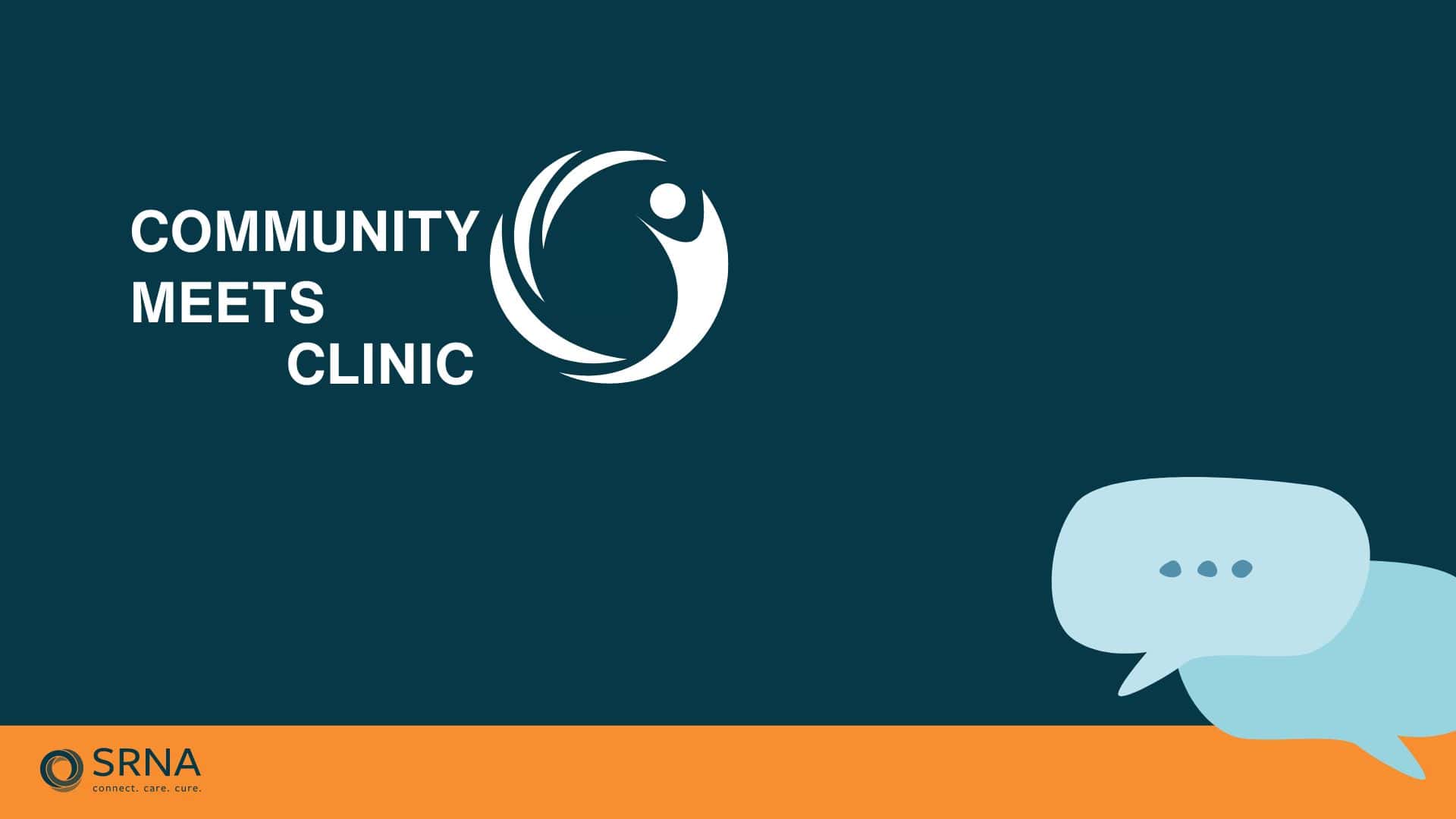Dr. Paula Barreras
March 19, 2024
The “Community Meets Clinic” podcast series introduces clinicians and healthcare personnel specializing in rare neuroimmune disorders. In this episode, Krissy Dilger of SRNA was joined by Dr. Paula Barreras. Dr. Barreras discussed her journey into neuroimmunology, emphasizing the impact of patient interactions [00:01:31]. Her early research focused on misdiagnoses in disorders like transverse myelitis, later expanding to neurosarcoidosis, aiming to improve diagnostic accuracy [00:02:42]. She shared how Cedars-Sinai’s multidisciplinary clinic, enhanced by specialists, offers comprehensive care, aiming to address patients’ various needs efficiently [00:05:41].
Transcript
[00:00:02] Krissy Dilger: Welcome to the “Community Meets Clinic” podcast series, a collaborative podcast to introduce the clinicians, clinician scientists, and healthcare personnel working directly with individuals and families facing a rare neuroimmune diagnosis. Hear directly from those in the clinic and connect with the individuals whose focus is promoting quality of life for those diagnosed with a rare neuroimmune disorder. My name is Krissy Dilger and I moderated this podcast. SRNA is a non-profit focused on support, education, and research of rare neuroimmune disorders. You can learn more about us on our website at wearesrna.org. Our “Community Meets Clinic” podcast series is sponsored in part by Genentech.
[00:00:50] Today we meet a clinician from Cedars-Sinai Medical Center, Dr. Paula Barreras. Dr. Paula Barreras is a board-certified neurologist with expertise in neuroimmunology. She is an assistant professor of neurology at Cedars-Sinai Medical Center. You can view her full bio in the podcast description. Thank you so much for joining me today. I’m really excited to be able to speak with you and learn a bit more about you as well as the clinic at Cedars-Sinai Medical Center. So to start, can you just tell me a little bit about yourself and what led you to neurology and in particular neuroimmunology?
[00:01:31] Dr. Paula Barreras: Sure. Well, thank you for the invitation. I’m very happy to be here. To start, what made me interested in neurology? I think I’ve always been fascinated by the brain, and in a way understanding the brain is a way to understand ourselves. So from the academic perspective, I’ve always been drawn to just doing more research and understanding that better. But really in neuroimmunology, I think it’s the patients and the nature of the interactions with patients. These disorders are treatable and I feel like we can really make an impact in people’s lives going into this field. So it’s a combination of the passion for understanding the brain and the puzzle-solving that comes with that, with the fact that I do love seeing patients long-term and being part of their journeys through these difficult times.
[00:02:26] Krissy Dilger: Thank you. So what led you to focus on the rare neuroimmune disorders specifically? Do you have any particular interest areas that you are working on in research concerning these disorders?
[00:02:42] Dr. Paula Barreras: Yeah. So in my early training, I came across patients that were diagnosed with transverse myelitis and noticed how even good neurologists were not very well versed in what that meant. And there was a lot of misdiagnosis and I had the opportunity to train at Johns Hopkins for many years and be part of the Myelitis Center there, where I started research into the misdiagnosis of transverse myelitis and how after an initial presentation, people usually go through a long period, sometimes years of being given the wrong label, the wrong treatment, until finally, somebody comes with the underlying cause for the spinal cord inflammation.
[00:03:26] So, my research initially focused on that, on how can we understand better when somebody first presents with a myelitis. The ultimate category of diagnosis that they fall into. In myelitis, myelitis just means a spinal cord inflammation and that inflammation can be from multiple sclerosis or from a disorder like NMO. It can be from an infection. It could be that it is not inflammation at all, that it looks like inflammation or is a tumor, or a vascular problem of the spinal cord. And making those distinctions is very important. So, my research has focused on understanding how to better differentiate those categories.
[00:04:12] And then, during my training, I came across another rare disorder which is neurosarcoidosis. And neurosarcoidosis is an autoimmune disease that can affect any organ of the body but specifically can affect the spinal cord. So it’s one of those rare diseases that often takes years to fully diagnose, but it looks a very distinct way. So lately, I’ve been studying the patterns of disease that we see in sarcoidosis when it affects the nervous system, brain, and spinal cord and some of the complications that these patients experience, to try to understand better how to treat them in the future.
[00:04:57] Krissy Dilger: Awesome. Well, that sounds like really important research. I know misdiagnosis is a huge issue that we’ve heard from a lot of our community members about for years. So any and all insight into that, I’m sure everyone can benefit greatly from that research that you’ve done and all the other research as well. So can you share a bit about your specific neuroimmunology, multidisciplinary clinic? I know you said you were at Johns Hopkins for a while. So how did the Cedars-Sinai Clinic come about or was it already there when you joined? Can you just tell me a little bit about the clinic itself?
[00:05:41] Dr. Paula Barreras: Sure. So I recently moved institutions and I’m very lucky to have joined Cedars-Sinai. There was already a group of neuroimmunologists here who are fantastic, whose focus is mainly multiple sclerosis. So really me joining the idea is that we created or expanded the neuroimmunology spectrum here to focus more in these rare disorders such as myelitis from various causes, including NMO, MOG, neurosarcoidosis, and others. And the nice thing about a center like Cedars-Sinai is that we have access to multiple specialists that can really address the different needs of patients with neurological disease. This is more than just a consult or, “Oh, this is your diagnosis,” which is a very important part and often the initial consult that patients get to.
[00:06:35] But neurological disease, especially when it affects the spinal cord leads to many quality-of-life issues that need to be addressed by multiple specialists. For example, bladder problems are very common and we do need assessment by urology and having urodynamic testing. So we have a good group here and a person specifically that would evaluate the patients with bladder dysfunction. We partnered with our colleagues in internal medicine that specialize in sarcoidosis. So if somebody comes with neurosarcoidosis affecting the spinal cord, we have a team of people, rheumatology, cardiology, pulmonology, ready to do the assessment of those various organs. So we can treat the whole disease and not to say, “Oh, you have this specific part, I’m only the doctor for your spinal cord and try to figure out the rest.”
[00:07:30] We have Dr. Lucy here who’s also a neuroimmunologist with a focus in optic neuritis and visual outcomes. So many of these disorders come with the unfortunate reality that they may affect the optic nerve. So it’s important that we have a mechanism to evaluate that thoroughly and properly. And we do have OCT which is a special technology to look at the back of the eye and the thickness of the optic nerve. So we have the ability to send patients to the visual outcomes lab and have that piece of information to better understand the disease. In addition, I know as a physician–and we’ve all been patients at some point for one reason or another–that navigating the system is difficult, especially when people are young and have never been sick before, this can be overwhelming. So we do have a fantastic team of people whose mission is helping our patients navigate the system.
[00:08:35] What I mean by that is, let’s say we start a medication and these medications are expensive. So they often require insurance approvals, infusion centers, things of that nature. We have a group of nurses that are in constant communication with our patients that help them understand what forms to fill out, help them navigate bureaucracy. And I think it’s a big help. And the other tool that we have available is social work, and it’s so important. These people with a neurological disease can come from all backgrounds and not everybody has access to the same resources. So understanding what resources are available, how different people’s living situations may be impacted by their diagnosis and what can we do about it, that piece is so important to the social work and we’re lucky to have that.
[00:09:35] And we also have neuropsychology here. The neuropsychology is usually important when people have cognitive symptoms and it’s so common to have the complaint of, “Oh brain fog or I don’t feel quite right.” And sometimes the scans don’t necessarily show an obvious cause for that. And just having a specialist evaluate what the cognitive function is and understand, yes, you have a memory problem or no or this is part of being stressed or normal anxiety or normal aging and having a baseline that we can track helps us out tremendously. So I feel like Cedars is in a very good position to help, which is the ultimate goal. To help a patient with neurological disease because we can provide the initial neurological consult and be the captain of the ship guiding for all of those needs, we’ll find a specific person for that.
[00:10:40] We also have a good team of physical therapists and occupational therapists, and PM&R physiatrists who are often, after the initial diagnosis and after the, let’s say the calm after the storm happens, there’s a lot to do to help with recovery. It’s a journey and it’s often a long journey where physical therapy is one of the most important things that we can do to help that spinal cord rewire and recover. So we do have a team of physical therapists also and they are well versed in neurological disorders which is also important. Sometimes physical therapy in centers that are not specialized, don’t understand the nuances of neuroimmunological disease and just focus for example, on strength, but some people have full strength and still have walking difficulties from sensory problems or balance problems. So I think that’s the nice thing here and we’re putting together this center so patients can come to one place and have all their care and multiple specialists taking care of them for their multiple needs.
[00:12:00] Krissy Dilger: That sounds completely amazing. I think that having that comprehensive care under one clinic is just so helpful for patients, especially navigating this for often new disease when people are newly diagnosed and just continuing on to the future. Having that cohesion between their specialists can save so much stress and unneeded anxiety about getting the right care. So it sounds like your clinic is truly a great place to go if you’ve been diagnosed with one of these disorders. So if you are someone with one of these disorders, how would a new patient go about getting started at your clinic? Do you need a referral? Are you accepting new patients?
[00:12:53] Dr. Paula Barreras: We are accepting new patients that includes patients with known diagnosis already. If somebody already has a diagnosis of NMO or MOG, or a multiple sclerosis, but also patients that are in the early stages of being diagnosed. So if somebody was given a diagnosis of possible transverse myelitis or TM, or just have a spinal cord lesion and they don’t know what it is, please reach out. They can be referred by their primary care doctors or the neurologist in the community, or they can be self-referred and just reach out to our center and we’ll do our best to accommodate them fast. We do have a triaging system such that patients that are recently diagnosed and need to be seen soon, can be seen soon. And it’s not necessarily a wait time of months like it is sometimes in other clinics.
[00:13:52] And people also get to us after they’ve been in the hospital, either here or in various centers, we often get emails or communications of, “Hey, this patient is hospitalized. They need to be seen soon,” and we do our best to accommodate them. We also see them in the hospital. So Cedars is an excellent place for inpatient care as well. And people that are hospitalized with myelitis often get the benefit of an immunology consult by me or one of my colleagues. And we can be there in the acute phase where things are happening and then follow them after clinic.
[00:14:36] Krissy Dilger: That sounds great. And I guess shifting to more personal side of all of this, I can imagine as a clinician, especially when you’re dealing with so much unknown with these disorders that it can be just difficult. So how do you take care of yourself? How do you stay grounded? How do you reenergize so that you don’t get overburdened with these sometimes difficult journeys and emotions from your patients?
[00:15:14] Dr. Paula Barreras: I think it’s important. That’s an interesting question because we often are asked, how are we helping others but not how we’re helping ourselves. So we don’t get this question very often. I think it’s true that there are a lot of unknowns and it’s frustrating for the patients and for us when there is a question that goes unanswered because we just don’t have information from research yet or because the patient didn’t read the textbook. And sometimes patients are unusual or atypical, especially in rare disorders. And there’s a lot of we’ll re-evaluate you over time and time will tell us and that can be frustrating for everyone.
[00:15:58] I think I take solace in the fact that that I know that these unknowns will motivate future research. So I see it as an opportunity to identify areas for where we can make an impact in a different way. So I may not have the answer for that patient in front of me at that moment. But I take that question back to my research side and that’s what’s motivated a lot of the research in misdiagnosis or in understanding how to identify these patterns. So by doing research, I think it’s a way of coping with that unknown. But also it’s so important to try to put a little bit of limits between being the caretaker and separate that from our personal lives a little bit.
[00:16:50] So I do have a baby and so I go home and just spend time with my daughter and that recharges me a lot, but it’s a difficult line to put. I think we’re not ever fully disconnected and I don’t want to be because ultimately we’re in this line of work because we care. So I don’t think compartmentalizing completely is possible or desirable.
[00:17:23] Krissy Dilger: That makes total sense. But it sounds like you’ve got a good system and I can imagine going home to your baby is definitely something that you can look forward to at the end of a rough day. But we’re almost done with our time. I guess I just wanted to open it up to you and ask if there’s anything else you’d like to share about your clinic or just anything you’d like people to know about, if they’re considering your clinic for care, or just anything you’d like to wrap up on?
[00:17:57] Dr. Paula Barreras: Yeah. Well, I think we’re a good center that has multidisciplinary care. I think for patients or for neurologists out there thinking where to refer the patients, I think it’s important to understand that it’s not just about seeing a good neurologist, which should be the given but is not always the case, you need to see a good neurologist that has access to the resources that you need. And those resources are you need a good system for physical therapy, urology, PM&R, and often pain management, social work, nurses. So there has to be a certain system in place. And I think we have that system, other major academic centers also have a similar system.
[00:18:49] So for these rare disorders, I think the message is go to a center that has multidisciplinary care. And for the doctors in the community and for some of our patients, I think the message is, there is more beyond the word transverse myelitis. We see a lot of misdiagnosis when a lesion appears in the spinal cord, the radiologist reads this as transverse myelitis, and then in a way sometimes thinking stops. It’s like, “Oh, that’s the final diagnosis transverse myelitis.” And it’s not. There’s a lot of layers to that and a lot of investigations that need to be done to reach that final diagnosis.
[00:19:31] So if you’ve been given a diagnosis of transverse myelitis and that’s it consider digging more into that. If you have a patient, if you’re a physician and you have a patient and the report says transverse myelitis, ask yourself, “What’s causing that transverse myelitis? Is there an underlying diagnosis that has yet to be assessed?”
[00:19:53] And we’ve done a lot of education events, some of them with the help of SRNA. Right now, we’re also planning a couple of location events for clinicians locally here and as part of CMSC to spread the word about the spectrum of myopathies and myelitis, and try to contribute if we can to educate other doctors that may come across patients with myelitis because I realize that not everybody has access to a big academic center at the beginning. So the more we can do in that area, then I figure that that helps too.
00:20:42 Krissy Dilger: That sounds great. And I just can’t thank you enough for sharing your clinic’s information and your own personal story about how you came to be in this field, and also just more about yourself. And we’re always happy to partner with clinics and physicians about education and awareness events, and we’ll be at CMSC as well. So just thank you so much for joining us and for your time and hopefully, we’ll hear from you again.
[00:21:17] Dr. Paula Barreras: Thank you for the invitation and the opportunity to share the work we’re doing.
[00:21:25] Krissy Dilger: Thank you to our “Community Meets Clinic” podcast series sponsor Genentech. Founded more than 40 years ago, Genentech is a leading biotechnology company that discovers, develops, manufactures, and commercializes medicines to treat patients with serious and life-threatening medical conditions. The company, a member of the Roche Group has headquarters in South San Francisco, California. For additional information about the company, please visit gene.com.
LISTEN & SUBSCRIBE
TO PODCAST
DOWNLOAD MP3
DOWNLOAD TRANSCRIPT










